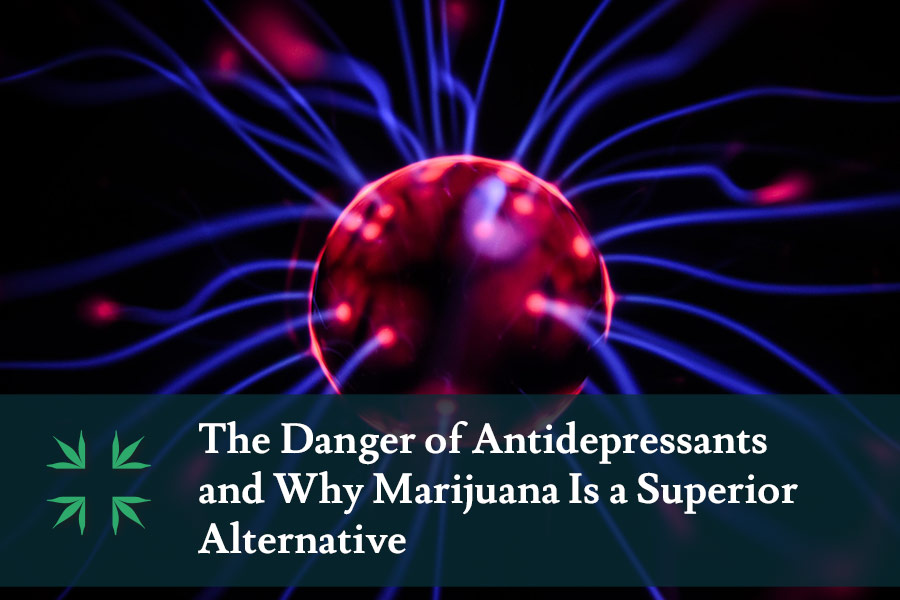Cannabis has been vilified in our culture as a “gateway drug” and worse leaving millions of Americans suffering from depression without many treatment options. According to the Anxiety and Depression Association of America 16.1 million adults over the age of 18 have suffered from one major depressive episode. One visit to a psychiatrist is all it takes to be prescribed an antidepressants for depression, anxiety, post-traumatic stress disorder, and a host of other mental health disorders.
What are antidepressants?
Antidepressants are medications prescribed to reduce feelings of worry and fear. If you walk into your psychiatrist’s office with symptoms of depression, anxiety, social anxiety, or seasonal affective disorder, you’ll likely be prescribed from five main types of antidepressants. The most commonly prescribed antidepressants, however, are selective serotonin reuptake inhibitors (SSRIs).
How do SSRIs work?
SSRIs effectively block the reabsorption of serotonin in the brain. Serotonin is a chemical messenger known as a neurotransmitter that sends messages from one brain cell to another. It takes four to six weeks for these medications to take effect. Serotonin is responsible for many biological functions, one of which helps us feel pleasure. When there are low levels of serotonin in the brain, it can lead to feelings of nervousness, fatigue and unhappiness.
Short and long term effects of antidepressants
While antidepressants may work initially, they are short-term solutions that have long-term effects. A landmark meta-analysis of 70 trials found that the suicide rate doubled for people over the age of 18 on antidepressants. Long-term dependence on SSRIs reduces the overall amount of serotonin released, meaning you’d need to increase your dosage to feel better.
Many who have tried to wean themselves off antidepressants have experienced “discontinuation syndrome,” which essentially means withdrawals. These symptoms are worsened for people who quit cold turkey or have been on antidepressants for a long time. Withdrawal effects can include dizziness, nausea, insomnia, irritability and aggression. These symptoms may persist for up to six weeks or longer and can cause some to return to taking the antidepressant to reduce the withdrawal symptoms.
Why is cannabis a superior alternative?
Cannabis is an natural mood enhancer that can work nearly instantly, especially during panic attacks. Microdosing cannabis by smoking or vaping it can increase the levels of anandamide and dopamine in the brain to make you feel good. Too high of a dose and you can increase your anxiety, which you can always decrease with cannabidiol (CBD), a non-psychoactive chemical compound found in cannabis.
Cannabis works through the endocannabinoid system which affects nearly every biological response in our body. Cannabinoids like CBD or the psychoactive tetrahydrocannabinol (THC) can improve immune system, increase metabolism, reduce pain and inflammation, all of which contribute to a better mood. Recent research even suggests that suicide rates are lower in states with medical cannabis; legalized states saw suicide rates drop by 10 percent. While you may experience cannabis withdrawal, especially as a heavy user, these symptoms are mild in comparison to antidepressants and aren’t permanent.
While cannabis may not be a cure-all for depression, it can be a powerful tool in your arsenal of therapies. Along with regular exercise, a healthy diet, and seeking professional therapy, cannabis can help you see the light beyond your negative thoughts.

Leave A Comment